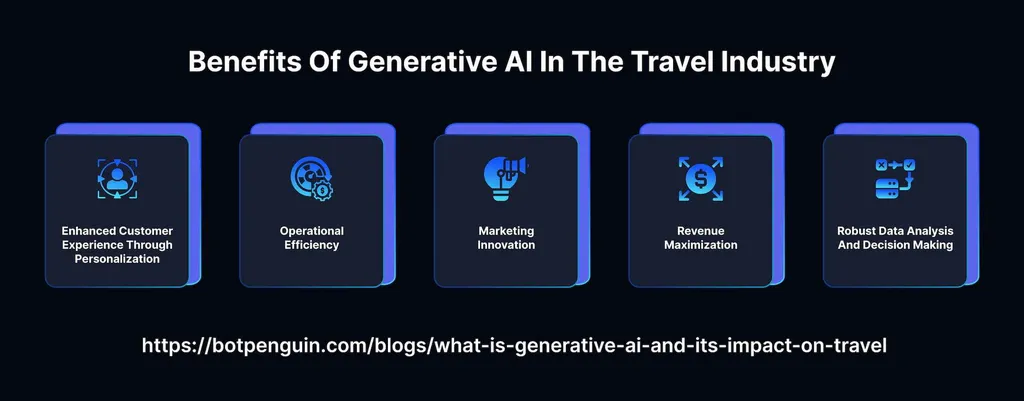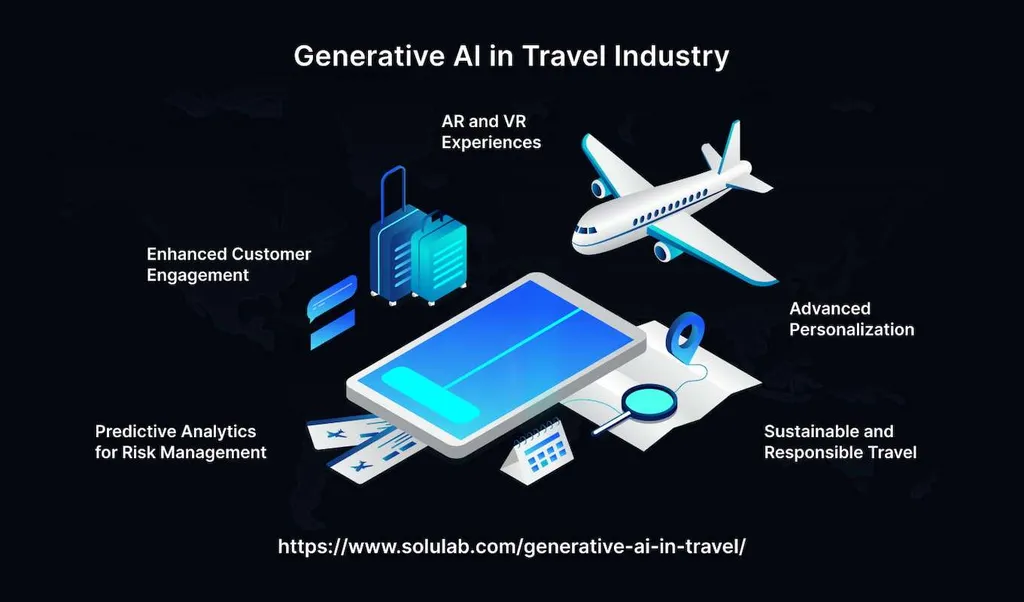The integration of Artificial Intelligence (AI) solutions allows companies to streamline their workflows and provide personalized services to their clients. Automated booking and trip-planning tools have demonstrated high efficiency in the travel industry. Companies also deploy algorithm-based tools to improve the accessibility of their customer support services. Large Language Models (LLMs) make travel apps more convenient to use and allow travelers to find detailed information about their favorite destinations. In this guide, we will consider different ways of using generative AI in travel and explore the potential opportunities that this technology opens for businesses.
What is the Role of Generative AI in Travel?

The growing impact of AI in the tourism industry has become increasingly noticeable since companies started to use such tools to help clients book trips. Over half of businesses have already implemented AI systems to optimize booking. Many clients now also use AI to discover new travel destinations and expedite itinerary planning. AI solutions are designed to provide personalized support. They remember a conversation history and collect a lot of information about customer preferences. The integration of such tools with a travel planning platform increases client satisfaction.
Here are the main features of such AI systems:
- Custom travel recommendations;
- Efficient upselling tools;
- Data collection and analysis capabilities;
- 24/7 support;
- AI-generated promotions for higher conversions;
- Real-time translation.
AI software optimizes each price depending on multiple factors. It allows agencies to surpass expectations and increase profits. Besides, enterprises utilize AI tools to produce professional-level content as well as develop virtual tours to promote their services.
Main Use Cases of Generative AI in Travel

Most travel businesses utilize GenAI to offer personalized tips to clients, enhance the efficiency of marketing efforts, increase outreach, and adjust prices in response to demand. The usage of AI in travel and hospitality segments facilitates saving money, reducing employees’ workload, and providing professional customer support. Below, we have described the main applications of this technology in the industry.
Efficient booking systems
Advanced systems use ML algorithms to produce AI-generated custom suggestions. They analyze client information about previous trips, consider their browsing habits, and collect data about their social media activity. It allows companies to identify client needs and choose the most suitable destinations for every occasion. If a person is interested in accommodations based on the sustainability principles, AI will suggest destinations known for eco hotels and relevant tourism activities.
When an individual receives a personalized reply, they understand that a company cares about their needs. Targeted suggestions help people improve their journeys and make them memorable. Personalized interactions enrich user experience and allow brands to strengthen ties with customers.
Itinerary planning
Modern travelers have refined tastes and do not want to go on generic trips. They are looking for unique experiences and want to follow an itinerary created based on their preferences. They may have a certain list of destinations they wish to visit. Besides, they might be interested in particular activities and have a limited budget. Generative AI bots develop itineraries with convenient travel routes. Such tools calculate ticket prices, look for affordable flights, and include multiple accommodations to choose from.
AI assistants create custom plans for enthusiasts of outdoor adventures, culinary tours, or biking trips. They suggest suitable transportation options depending on a person’s preferences and finances. Besides, they consult clients on cultural differences and advise them on how to behave when communicating with locals. Such advanced tools provide a client with an easy-to-navigate map with their destinations conveniently marked. An AI-generated itinerary gets updated in real time when flights get delayed.
Virtual travel assistants
AI helpers are available 24/7. They answer queries efficiently and handle increased workload with ease during high season. Customers save much time and budget due to the assistance of AI bots. The interaction with such solutions enables travelers to find suitable hotels, develop easy-to-follow itineraries, and pay for flights. AI assistants rely on NLP technology to make a conversation more engaging. They answer questions regarding flights, offer upgrades, and make helpful suggestions.
AI software analyzes every step of a customer journey and alleviates customer concerns. Such apps may suggest affordable tours, recommend particular activities or transportation options, and provide virtual travel assistance. AI bots follow clear escalation rules and pass complex cases to human agents. They communicate with multiple clients simultaneously and change reservations per their requests.
Efficient marketing campaigns
Each customer has specific preferences and needs. Travel agencies motivate them to reserve a trip by making targeted offers. It allows them to meet the expectations of their clients and boost profits. Tailored marketing campaigns require the use of AI algorithms trained to analyze data about previous bookings, search history, and client preferences.
The usage of Gen AI in travel industry facilitates creating complete customer profiles that include information about budget limitations, preferred places for staying, and destinations. Based on this data, companies develop special promotions that clients may find enticing. This strategy leads to repeat bookings and results in higher profits.
Instant translations
When planning a trip to a non-English speaking country, one can use travel apps with in-built AI translation tools. Such bots allow travelers to ask for directions, interact with locals in their native language, book rentals, and read descriptions and instructions. A client can visit any country, knowing that they will be able to solve any problem with the assistance of a powerful virtual helper. They use AI to research a specific location, ask police officers for help, read descriptions in museums, and communicate with taxi drivers with ease.
Dynamic pricing tools
Travel companies seek to make their services profitable and adjust the prices of their packages depending on current demand. AI algorithms consider multiple factors when choosing the most suitable price of a package. They analyze current supply, weather conditions, season, and events scheduled in a specific location. Dynamic pricing allows travelers to book trips within their budget. Companies like Airbnb change the cost of listed rentals depending on dates, current demand, and location. Travel businesses rely on AI to increase the number of bookings, avoid overpricing their services, and improve client satisfaction by offering appealing deals with generous discounts.
AI-generated content
Travel agencies deploy GenAI to design promotional materials, create attention-grabbing visuals, and write enticing descriptions of scheduled trips. They use AI to customize marketing materials depending on the preferences of a particular audience segment. AI-generated visuals help brands increase their visibility on social media and advertise their services better.
Professional virtual tours
When planning trips, many people prefer to watch a virtual tour to make up their mind about a particular destination. Many countries started to leverage this trend and offer VR tours for those who want to visit heritage sites and other popular tourist locations. GenAI apps create professional-level images and 3D models of places based on photos. Travel companies use such tools to advertise their offerings and motivate clients to book tours. They also create personalized VR experiences catering to the needs of their VIP clientele.
How Generative AI in Travel Works
Companies deploy algorithm-driven tools to develop helpful recommendations based on a user’s prompts. AI systems can be fine-tuned to analyze specific datasets and provide useful guidelines for clients to follow. They function in the way described below:
- User input analysis. When a client describes their wishes, a digital agent provides relevant recommendations based on an in-depth analysis of the query. Advanced AI has impressive analytics capabilities and can generate helpful responses in a few seconds.
- GenAI data processing. AI considers a person’s booking history, online searches, wishlists, individual preferences regarding accommodations, favorite activities, demographics, budget, and other information. LLMs utilize data from large datasets. They recognize behavior patterns, anticipate demand, and know how to address concerns to improve user satisfaction.
- Accessing multiple data sources. AI software discovers information about affordable flights, accommodations within a certain budget, and local attractions. Virtual assistants analyze user reviews and offer options that are likely to appeal to customers.
- Personalized advice. The importance of a chatbot for the travel industry is hard to underestimate. Algorithmic tools generate custom travel plans, recommend multiple suitable hotels, and provide comprehensive guides.
- Direct booking opportunities. Travelers review the recommendations and click direct links to book accommodations and flights.
It might be challenging to build and integrate custom LLMs with legacy systems without relevant experience. The process requires significant investments and can be quite time-consuming. This is why agencies often outsource this task to reputable service providers to benefit from their expertise and save money.
How Generative AI Changes Travel
Companies make GenAI tools part of their systems to achieve higher efficiency and personalize services. This technology is expected to transform the industry in multiple ways:
- Efficient protection of customer data and better compliance. AI tools safeguard client information through encryption. They use secure storage and detect signs of suspicious behaviors, which allows them to minimize the possibility of data breaches. Enterprises deploy AI to ensure that their offerings are compliant with local regulations. Users agree to provide data, as they know how their inputs will be used. By remaining fully transparent and maintaining high data privacy, companies foster trust and maintain compliance.
- Personalized travel experience. A modern travel app with GenAI tools has intuitive functionality and allows users to quickly find the information they are interested in. Integrated digital assistants simplify searching through different platforms and databases. Streamlined navigation and personalized responses contribute to the success of such solutions.
- Ethical use of AI. Travel app developers are aware of potential AI biases and take the necessary steps to eliminate them and make their services accessible. Users can control what type of data they want to store and how it can be used.
- Improved performance due to continuous learning. AI travel apps provide more accurate recommendations when they learn more about a particular customer. They refine their suggestions after analyzing real-world data.
- Enhanced client control over travel experiences. With the help of GenAI tools, users can choose suitable flights and accommodations using special filters. It simplifies trip planning and contributes to a more memorable travel experience.
AI planner apps are thoroughly tested by developers. Their integrated AI assistants are built to maintain human-sounding conversations and provide relevant replies without any mistakes. The deployment of AI chatbots, planning systems, and analysis tools transforms travel businesses and allows them to achieve lasting sustainability.
Final Thoughts
Travel businesses can stand out among competitors by integrating AI. Making it part of their routines will help them increase conversions, improve retention, and augment UX. However, despite the increased interest in such tools, enterprises may find it difficult to build and customize them. They are based on advanced LLMs that should be trained on large datasets of the highest quality.
Companies can benefit from contacting third-party providers if they want to utilize generative AI in travel businesses. MetaDialog builds powerful LLMs designed to optimize processes and simplify client interactions. Its enterprise-level systems automate up to 81% of replies to user queries and reduce the average resolution time. Travel agencies can deploy AI tools to create engaging virtual tours, adjust prices dynamically, and increase sales. Get in touch with our team now and deploy AI solutions to boost conversions and achieve higher engagement.
